Ingredients
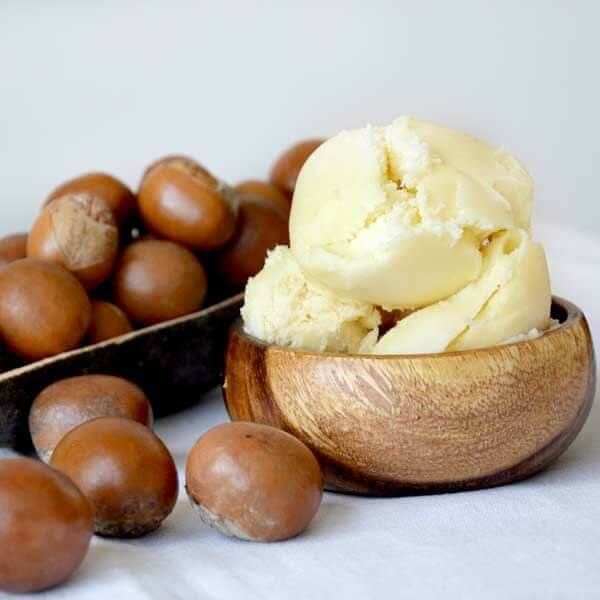
Shea Butter
Shea butter is an exceptional moisturizer for the body and face. It is rich in fat with humectant and emollient properties. It locks in the moisture inside the skin while keeping it hydrated for long. The application of butter from shea restores the natural elasticity of your skin. The vitamin F and non-saponifiable matter in the butter are essential ingredients for maintaining the elasticity of the skin. Shea butter is deemed as one of the top anti-aging agents for your skin. It boosts the production of collagen, a protein that has youthful scaffolding impacts on the skin. The vitamins E and A present in the butter keep the skin radiant and nourished. Since shea fat is rich in vitamin A, it aids in the promotion of disinfection, healing, and soothing of skin allergies. The antimicrobial and anti-inflammatory properties speed up the process of healing. Shea fat works as a natural sunscreen by offering protection against the sun’s ultraviolet radiations.
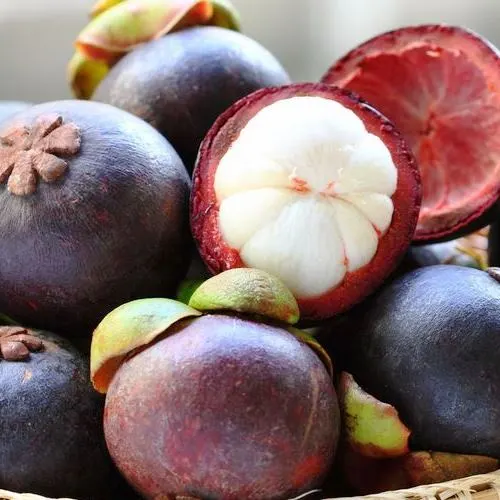
Kokum Butter
Kokum butter is high in essential fatty acids like omega-3 and omega-6 helping your body sustain healthy skin cell membranes to prevent damage. Kokum butter is probably best known for its role as a potent emollient, or moisturizing agent. It can be used to improve the moisture content of almost every part of the body, including your skin, lips, feet, scalp, and hair. Kokum provides oxygenation of the cells, which means that the necessary nutrients get to your skin. You will be amazed at how much better your skin looks with regular use. The cells’ oxygenation can help with fine lines and wrinkles you already have, and it can prevent new ones from forming. The moisturizing nature of the butter, along with the antioxidant and antimicrobial capacity of the compounds found in kokum fruit is the strong potential for soothing various inflammatory skin conditions. Kokum butter is rich in vitamin E. This fat-soluble, essential nutrient is a powerful antioxidant. It not only benefits the immune system, skin health, and cell functioning, it also protects the skin against free radicals.
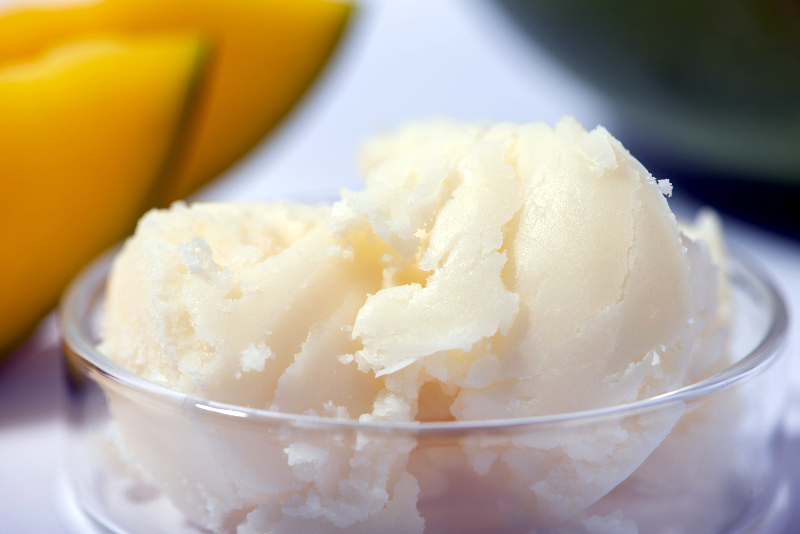
Mango Butter
Mangoes are loaded with nutritious substances, fiber, vitamins (C, B6, A, E, and more), and minerals. They’re good source of folate, potassium, calcium, and beta carotene. Mango butter is effective in preventing inflammation and itching caused by dry skin. It is an excellent source of triglycerides. These are fatty acids that work as emollients to soften the skin and prevent it from feeling dry and itchy. It also contains Vitamin C, which is beneficial for your skin in many ways. Mango butter comes in contact with oxygen, it produces salicylic acid. Salicylic acid is an excellent exfoliant that works by softening a specific protein in the skin called keratin. This helps remove the top layer of the skin that has become scaly, itchy, and dry. Mango butter contains antioxidants like vitamin C that fight free radicals in your skin. Free radicals are molecules that create havoc in the body. They damage tissue and DNA, contributing to wrinkles and other skin issues. This prevents your skin from developing wrinkles. It also aids in collagen production, a protein naturally present in your skin that keeps it firm and wrinkle-free.
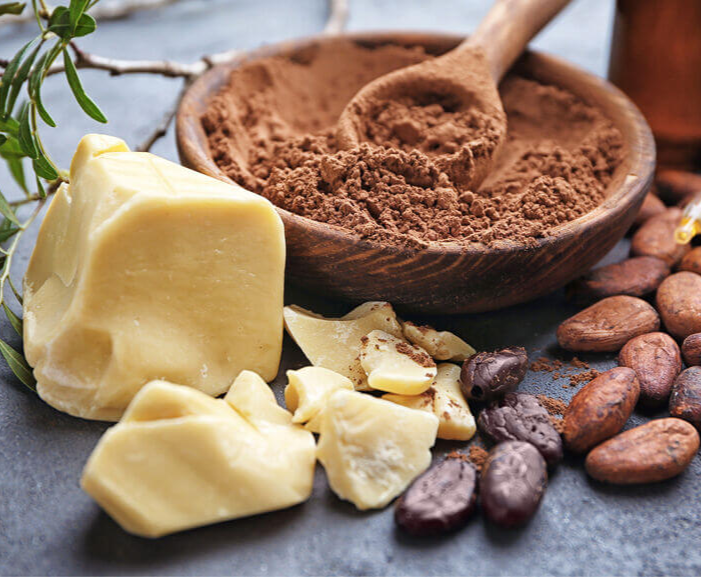
Cocoa Butter
Cocoa has been in use for around 3,000 years. Ancient Aztecs and Mayans have used Cocoa for its medicinal properties. Cocoa butter is high in fatty acids, with an excellent ability to hydrate and nourish the skin and improve elasticity. The fat in cocoa butter forms a protective barrier over the skin to hold in moisture. Cocoa butter is also rich in natural plant compounds called phytochemicals. These substances may improve blood flow to the skin and slow skin aging by protecting against damage from the sun’s harmful UV rays. Cocoa butter is a good source of vitamin E, which benefits your body in many ways. Cocoa butter is a primary component of many topical treatments for conditions like eczema and dermatitis. The rich moisture content and protective oil-based nature of cocoa butter ease itching and allow the skin to heal after a flare-up. Exposure to UV radiation can cause changes in skin texture, damage skin cells, and even increase the risk of skin cancer. The hytochemicals in cocoa butter may protect against skin damage from harmful UV rays and lower your risk of skin disease.
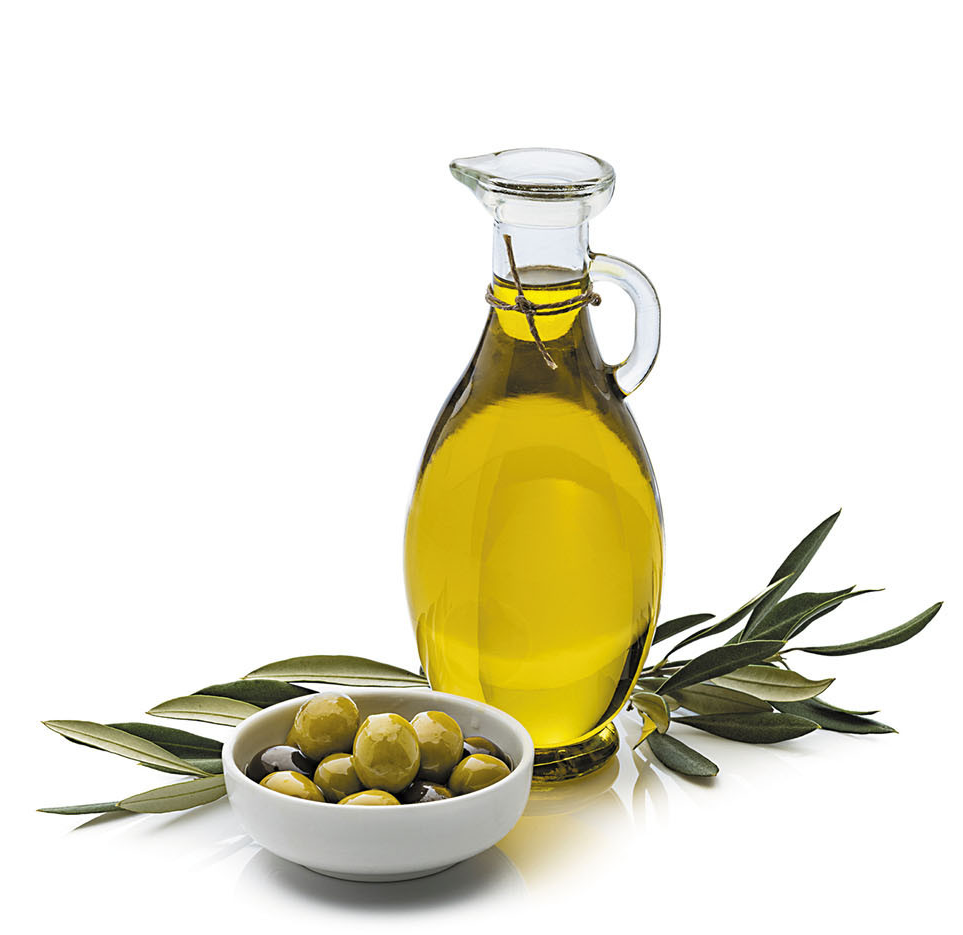
Olive Oil
Olive oil comes from olives, the fruit of the olive tree. Olives are a traditional crop of the Mediterranean region. People make olive oil by pressing whole olives. Olive oil is packed with healthy vitamins, fats, and antioxidants, and these components can contribute to healthier-looking skin. It moisturizes skin by locking in moisture, and its antioxidants can help to improve signs of aging. Olive oil contains squalene and vitamin E. Squalene supports the skin’s moisture retention, whereas vitamin E increases the skin’s capacity to absorb and retain water. Olive oil is rich in antioxidants. These compounds can combat oxidative stress, which is associated with skin aging. They can also increase collagen in the skin. Olive oil also has anti-inflammatory and antimicrobial properties, which can aid in healing.
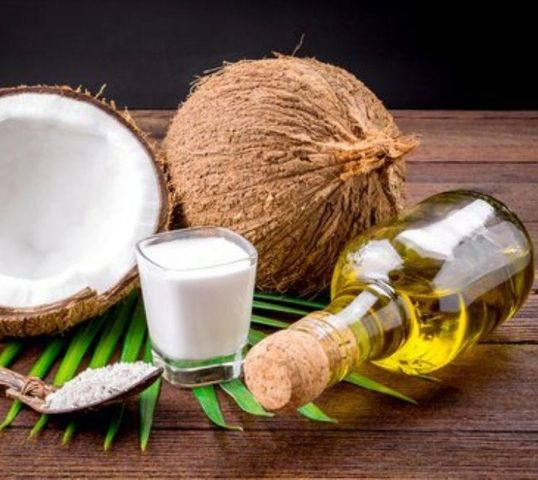
Coconut Oil
Coconut oil is made up of medium-chain fatty acids that help to reduce dryness and allow your skin to retain moisture. Coconut oil provides a protective barrier, shielding skin from environmental toxins, dirt, and other environmental pollutants you’re faced with every day. Applying coconut oil to your skin has a smoothing, softening effect; and over time, it can actually help to improve your skin’s texture. Coconut oil can help to diminish the signs of aging when used regularly. By hydrating and softening the skin, it works to make those little lines and wrinkles appear far less obvious. This nutty oil has a soothing, calming effect and can help reduce temporary redness when applied to the skin. With antioxidant and phytonutrient (plant compounds) components, coconut oil for the face can help boost your nutrient factor and fight against environmental stressors that accelerate signs of aging. Coconut oil absorbs into the skin easily and swiftly, providing instant hydration and protection.
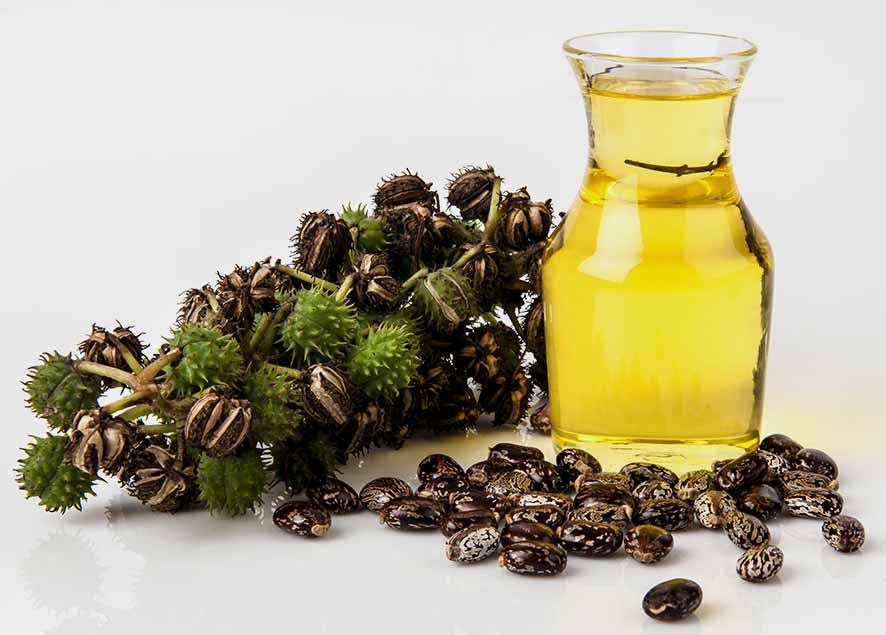
Castor Oil
Castor seed oil contains undecylenic acid, which has germicidal and disinfectant properties. It is often used for treating skin diseases and skin ulcers, particularly those that are caused due to bacterial or fungal infections. Castor oil is also used to protect burns and wounds from infections and is extensively used as a skincare agent as it helps in treating acne, pigmentation, and sunburn and preventing blemishes and stretch marks. Castor oil is also a deep cleanser that will get rid of pimples fast, and deep-clean your skin of dirt, bacteria, dead skin cells, and excess oils while keeping your skin soft and flawless. Castor oil is great for reducing fine lines and wrinkles because it penetrates deep into your skin, which stimulates the production of elastin and collagen. These two components in the skin are responsible for its elasticity and tautness. Castor oil's emollient properties allow the skin to quickly absorb it, keeping your face hydrated and plump, which is also important in reducing the appearance of fine lines and wrinkles.
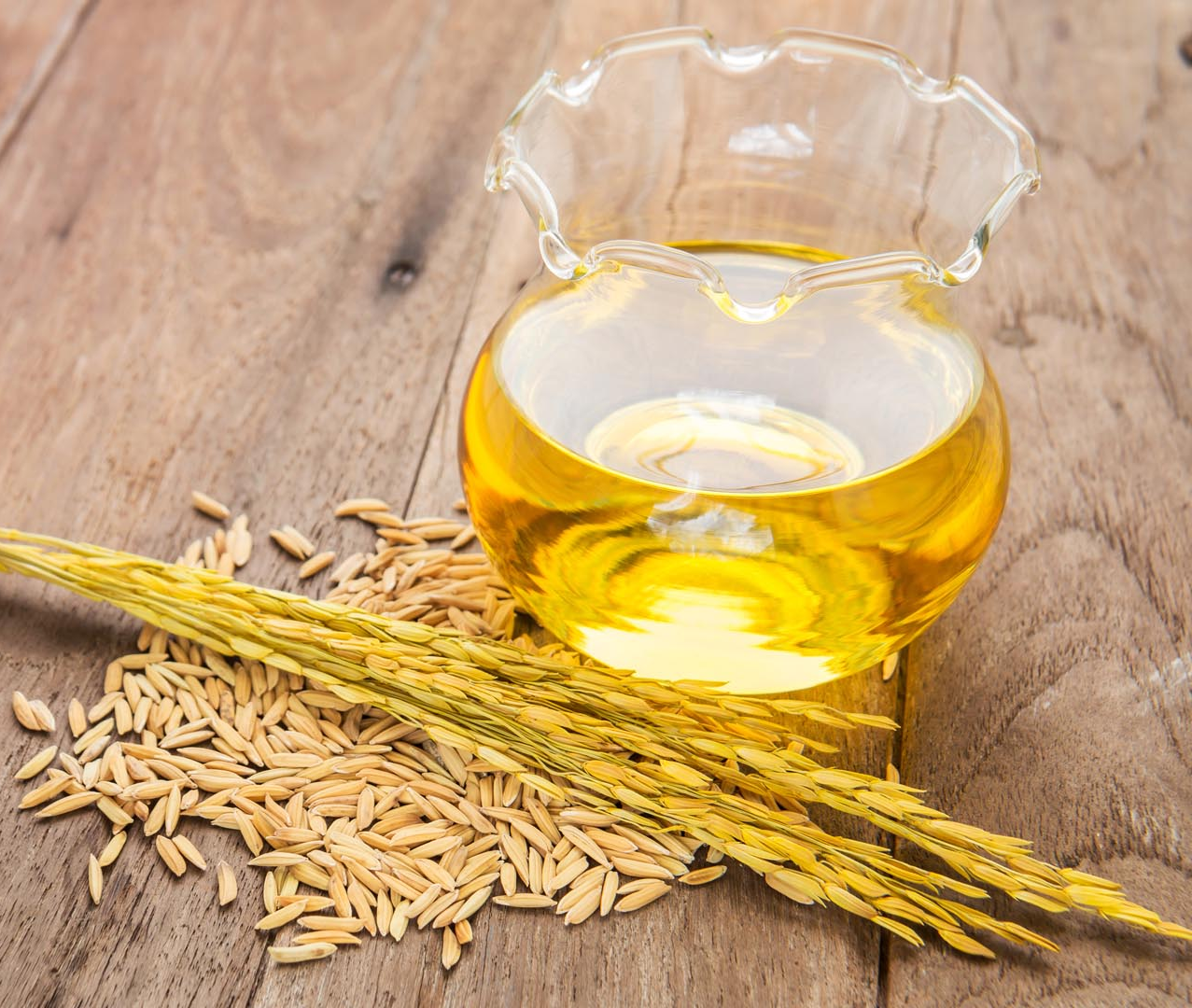
Rice Bran Oil
Rice bran oil is an all-natural wonder when it comes to anti-aging skin care. It works by delivering a variety of powerful antioxidants, vitamins, and fatty acids directly to your skin. These compounds work together to turn back the clock while also fighting off free radicals that can lead to wrinkles, fine lines, and other signs of aging. Rice bran oil has the potential to promote hydration, reduce pigmentation, even out skin tones, and diminish the appearance of fine lines and wrinkles. The skin benefits of rice bran oil are largely attributed to the high level of vitamin E, vitamin B, omega 9, and a rich array of fatty acids. In addition, it contains a rich source of antioxidants, such as beta-carotene, CoQ10, and lycopene, that can shield skin from environmental and internal stressors. Antioxidants are vital to sustaining that younger and healthier glow. The presence of ferulic acid and esters in rice bran oil can potentially boost hair health.
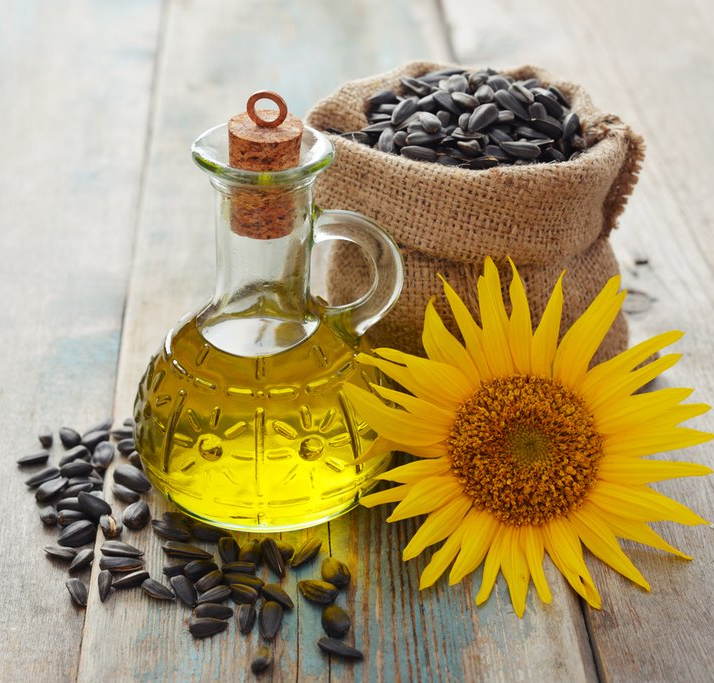
Sunflower Oil
Sunflower oil is rich in essential fatty acids like linoleic acid, palmitic acid, and polyunsaturated fats that help moisturize dry skin, protect the skin from UV radiation damage, and restore the skin barrier. Sunflower oil is both a moisturizer, provides hydration and has emollient properties that smooth the skin. The anti-inflammatory properties of sunflower oil can help to soothe the skin and reduce irritation. Additionally, sunflower oil can help with wound healing and decrease the appearance of scars. Sunflower oil is rich in vitamins A, C, and E, as well as omega-6 fatty acids. These nutrients work together to nourish the skin and keep it healthy. The skin’s protective barrier is also strengthened, resulting in softer, smoother skin. The nutrients in sunflower oil can help to reduce the appearance of fine lines and wrinkles making it an excellent facial oil. Additionally, sunflower oil can help to improve skin elasticity while vitamin A helps with the development of new skin cells.
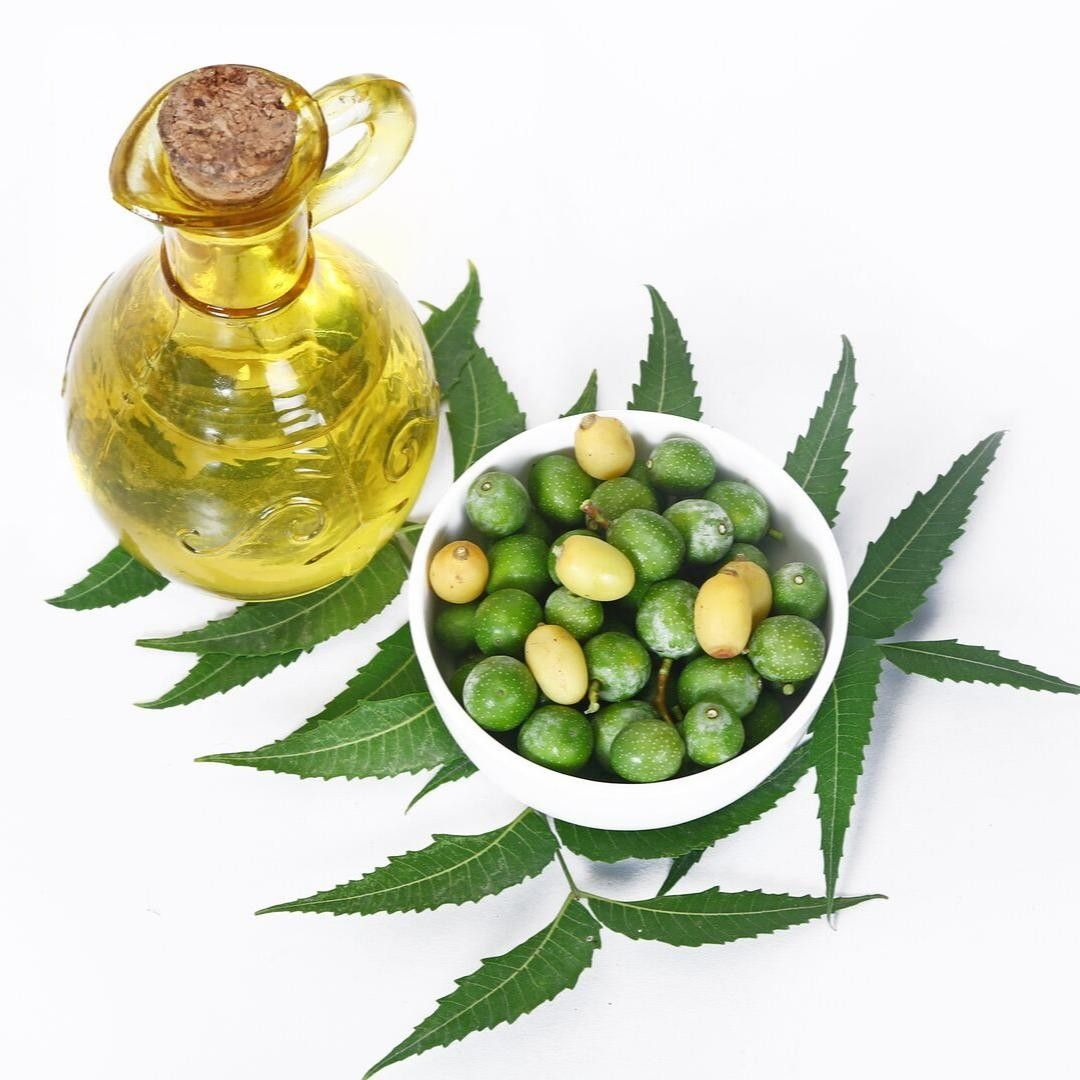
Neem Oil
Neem oil is rich in fatty acids, such as palmitic, linoleic, and oleic acids, which help support healthy skin. Neem oil can be used for the skin in a variety of ways. It can protect against and treat various fungal infections on the skin and nails, while also eliminating inflammation and improving the appearance of blemishes and age spots. It can reduce the severity of sunburns, provide moisture to the skin, lower the occurrence of acne through its antibacterial action, and promote the growth of healthy new cells to give your skin a healthy glow. The active ingredients in neem oil not only reduce inflammation but also promote healing. Fatty acids in neem oil build collagen and maintain the elasticity of the skin. Neem oil helps speed healing and reduces scarring. The antimicrobial and antifungal properties help keep the skin healthy during the healing process. The moisturizing, antibacterial, and nutrient-dense nature of the oil makes it ideal for optimizing hair health by preventing excess water from being absorbed by your hair.
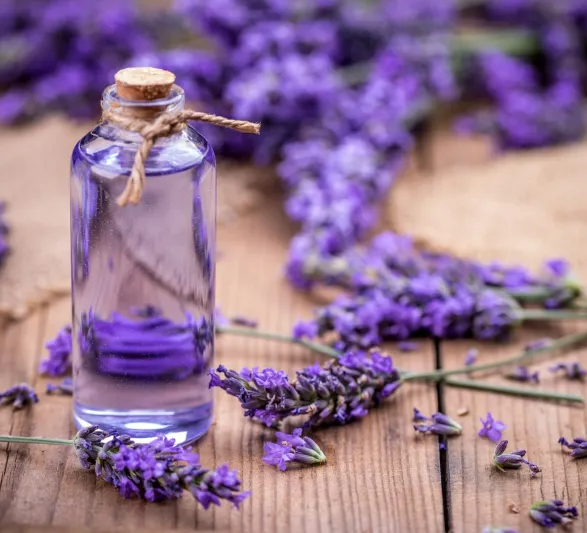
Lavender Essential Oil
Lavender essential oil has a soothing aroma and versatile properties and has long been cherished for its remarkable skincare benefits. From calming irritated skin to promoting a youthful complexion, the lavender essential oil is a natural wonder that has earned its place in our beauty routines. Lavender oil works to kill bacteria, and this can prevent and heal acne breakouts. It unclogs pores and reduces inflammation when you put it on your skin. Lavender’s name comes from the Latin word “lavare”, which translated means “to wash”. Lavender essential oil has antiseptic properties that can support healthier skin. Its antibacterial properties Lavender oil can aid in evening skin tone since it reduces inflammation. It can reduce discoloration, including dark spots. Lavender oil helps lessen blotchiness and redness. If you have hyperpigmentation on your skin, lavender oil may be able to help with that as well. Free radicals are partly responsible for fine lines and wrinkles on the face. Lavender oil is full of antioxidants, which help protect you from the free radicals.
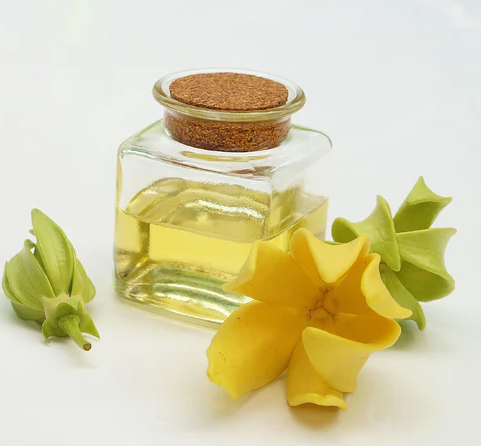
Ylang Ylang Essential Oil
“Ee-lang Ee-lang” is the pronunciation of Ylang-Ylang. Ylang Ylang is a yellow, star-shaped flower that grows on the Cananga tree (Canangaodorata). This tropical species is native to countries surrounding the Indian Ocean, such as India, the Philippines, Malaysia, Indonesia, and parts of Australia. Ylang Ylang’s heady, aromatic scent is fruity, flowery, and rich. Ylang Ylang essential oil is believed to offer various benefits for the skin, including moisturizing properties that balance sebum production, making it suitable for different skin types. Its reported anti-inflammatory and antibacterial properties may help soothe irritated skin, reduce redness, and prevent infections. Additionally, the oil's ability to regulate sebum production could be beneficial for those with oily or combination skin. Ylang Ylang oil is thought to enhance circulation, contributing to a healthier complexion, and its aphrodisiac properties.
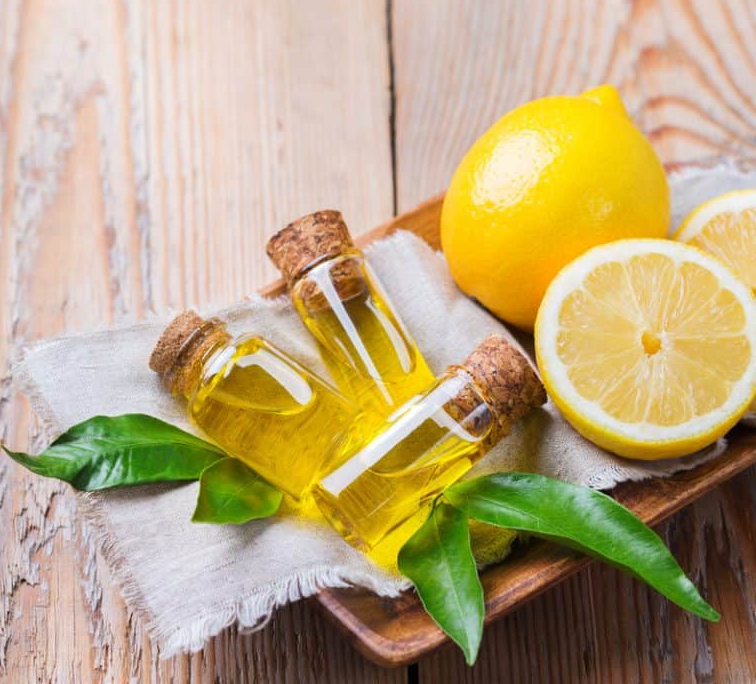
Lemon Essential Oil
Lemon essential oil, extracted from the peel of the lemon fruit, is renowned for its refreshing scent and celebrated for its potential benefits for the skin. Rich in antioxidants, it may help combat free radicals, promoting a healthier complexion and potentially reducing signs of aging. The oil's antimicrobial properties make it a popular choice for those dealing with acne, as it can help fight bacteria and contribute to a clearer complexion. Lemon oil's astringent qualities may assist in toning and tightening the skin, particularly beneficial for individuals with oily or acne-prone skin. Additionally, its skin-brightening properties are often harnessed to address dark spots and promote an even skin tone. One of the best lemon essential oil benefits for the skin is fighting off acne. This oil can help skin that is acne-prone by keeping the surface clean and preventing bacteria from entering your pores. Also, the antiseptic effects come in handy.
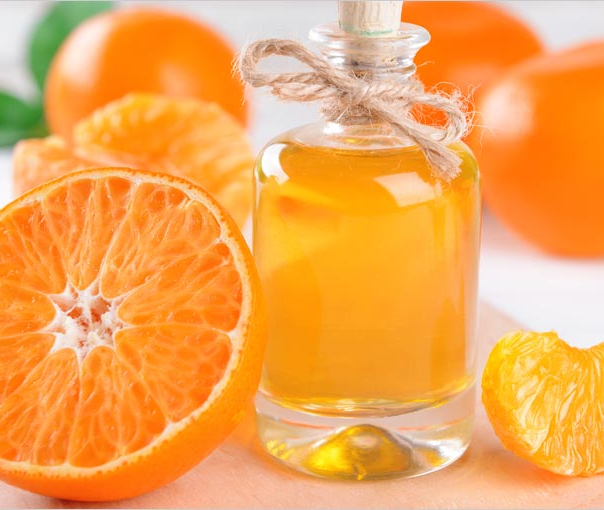
Sweet Orange Essential Oil
Sweet orange essential oil, extracted from the peels of ripe oranges (Citrus sinensis), is renowned for its skin-friendly properties. Enriched with antioxidants like limonene, it helps protect the skin from environmental stressors, potentially reducing the effects of free radicals and promoting a youthful complexion. Beyond its aromatic appeal, the bright and uplifting scent of sweet orange oil can positively influence mood, making it a popular choice for aromatherapy and relaxation.
The mild astringency of sweet orange oil contributes to its toning effects on the skin, promoting a firmer and more elastic appearance. This makes it particularly suitable for individuals with oily or acne-prone skin, as it may help balance oil production and reduce the risk of breakouts. The oil's antimicrobial properties are believed to assist in preventing and addressing skin blemishes by combating bacteria.
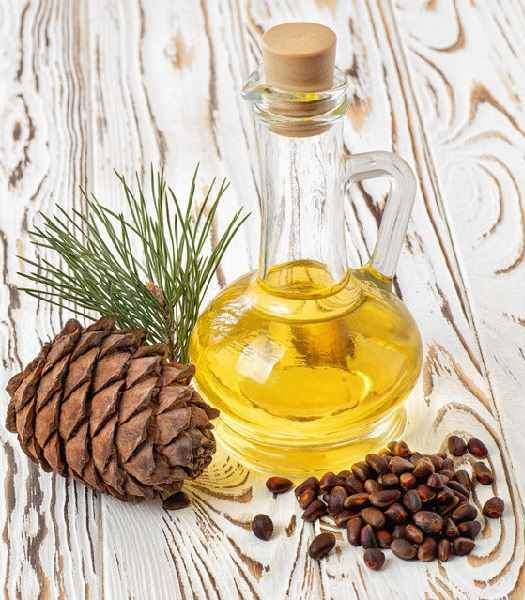
Cedarwood Essential Oil
Cedarwood essential oil, derived from the wood of cedar trees, is prized for its potential benefits for the skin. With its anti-inflammatory and antimicrobial properties, cedarwood oil may be effective in soothing irritated skin and combating bacteria, making it a valuable addition to skincare routines. Its astringent qualities contribute to the oil's ability to tighten and tone the skin, which can be particularly beneficial for individuals with oily or acne-prone skin. Cedarwood oil is also known to promote a calming and grounding effect, making it a popular choice in aromatherapy. Improved circulation is another potential benefit of cedarwood essential oil, which may contribute to healthier skin. Better blood flow can help deliver essential nutrients to the skin cells, promoting optimal skin function and radiance.
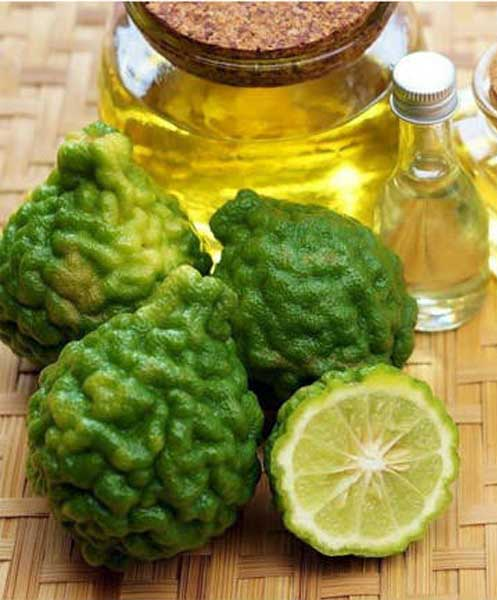
Bergamot Essential Oil
Bergamot essential oil, extracted from the rind of the bergamot orange, provides an array of benefits for the skin. Its potent antiseptic and antibacterial properties make it an effective natural remedy for acne and blemishes, helping to prevent the proliferation of bacteria on the skin. The oil's astringent qualities contribute to its ability to tone and tighten the skin, promoting a smoother and more youthful appearance. One of the standout features of bergamot essential oil is its skin-brightening effect. It contains compounds that may help even out skin tone, reduce the appearance of dark spots, and impart a natural radiance to the skin. This makes bergamot oil a popular choice for individuals seeking a more luminous complexion.
Beyond its topical benefits, the aromatic profile of bergamot oil is widely appreciated. Its citrusy and floral notes create a refreshing and uplifting scent that can help alleviate stress and anxiety. Many people incorporate bergamot oil into their skincare routines not only for its skin benefits but also for its potential to enhance overall well-being through aromatherapy.
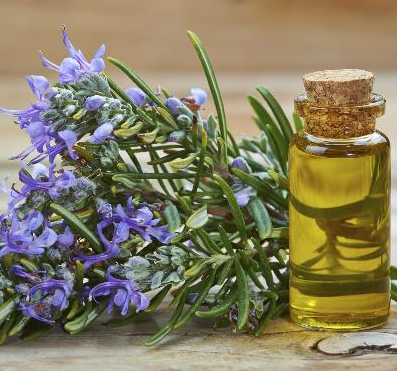
Rosemary Essential Oil
Rosemary essential oil, extracted from the leaves of the Rosmarinus officinalis plant, is known for its versatile benefits for the skin. Its potent antimicrobial properties make it effective against acne, helping to cleanse the skin by combating bacteria and preventing breakouts. Rich in antioxidants like rosmarinic acid, rosemary oil offers protection against free radicals, potentially reducing the appearance of wrinkles and promoting skin elasticity. The astringent nature of rosemary essential oil makes it particularly useful for toning and tightening the skin. This property can be beneficial for individuals with oily or combination skin, helping to balance sebum production and minimize the appearance of pores. Additionally, the oil is believed to stimulate blood circulation, enhancing the delivery of oxygen and nutrients to the skin cells. Improved circulation can contribute to a healthier complexion and a natural, radiant glow. Beyond its physical benefits, the invigorating and herbaceous scent of rosemary oil has aromatherapeutic effects. Inhaling its aroma is thought to promote mental clarity, focus, and alertness, making it a popular choice for aromatherapy.
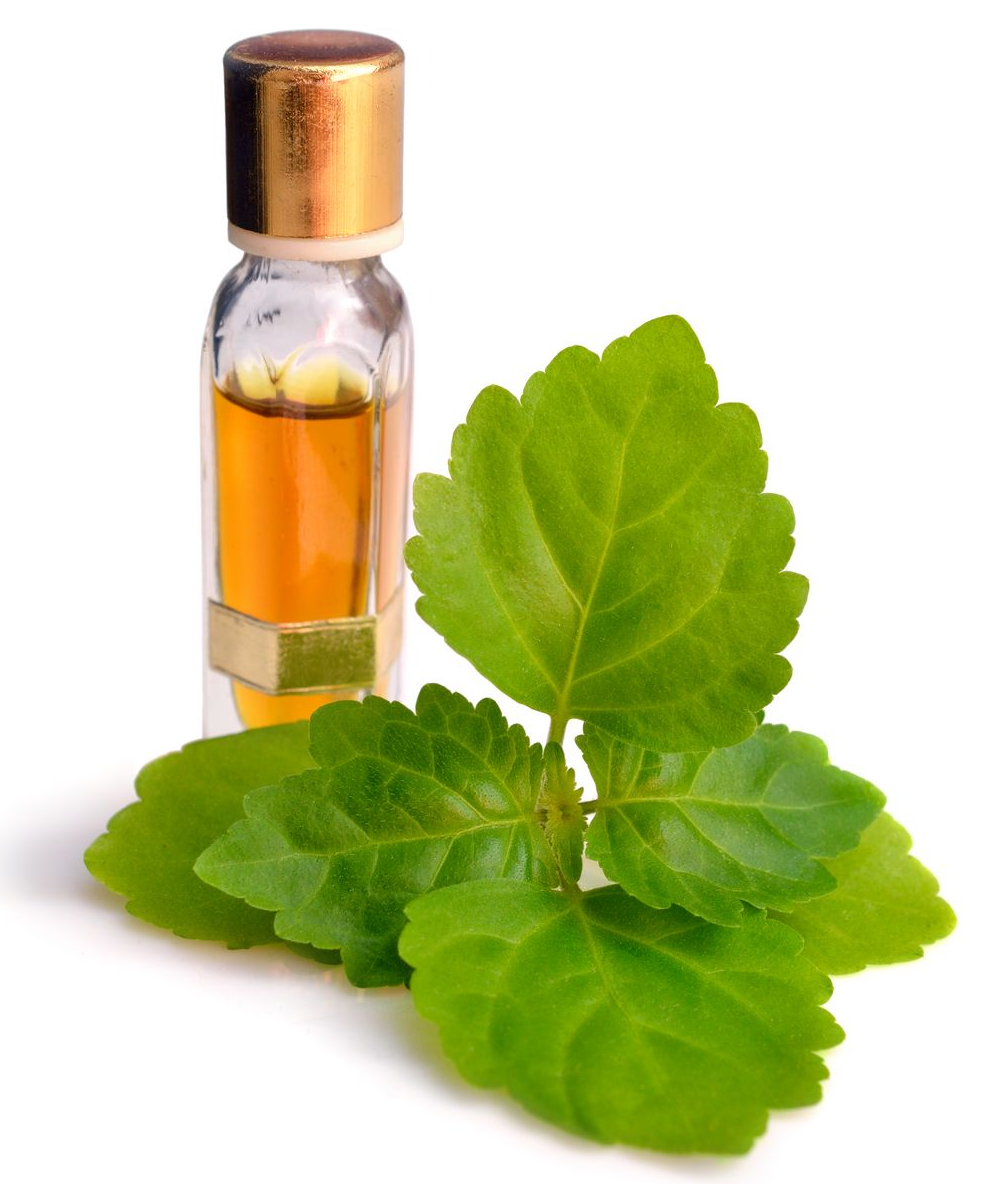
Patchouli Essential Oil
Patchouli essential oil, extracted from the leaves of the Pogostemon cablin plant, is renowned for its multifaceted benefits for the skin. Its potent antimicrobial properties make it a natural choice for skin care, helping to protect against infections and promote overall skin health. The oil's astringent nature is advantageous for toning and tightening the skin, contributing to a more youthful and firm complexion. For individuals with oily or acne-prone skin, patchouli essential oil is often prized for its ability to balance sebum production. By regulating oil levels, it can help prevent breakouts and reduce excess shine, fostering a clearer and more balanced skin tone. The anti-inflammatory qualities of patchouli oil make it effective in calming and soothing irritated skin conditions, offering relief from redness and discomfort. Patchouli essential oil is also associated with promoting skin cell regeneration, potentially aiding in the healing of scars and blemishes. This property contributes to the oil's reputation for supporting a more even skin texture and reducing the appearance of fine lines and wrinkles. Patchouli oil is celebrated for its distinct earthy and grounding aroma.
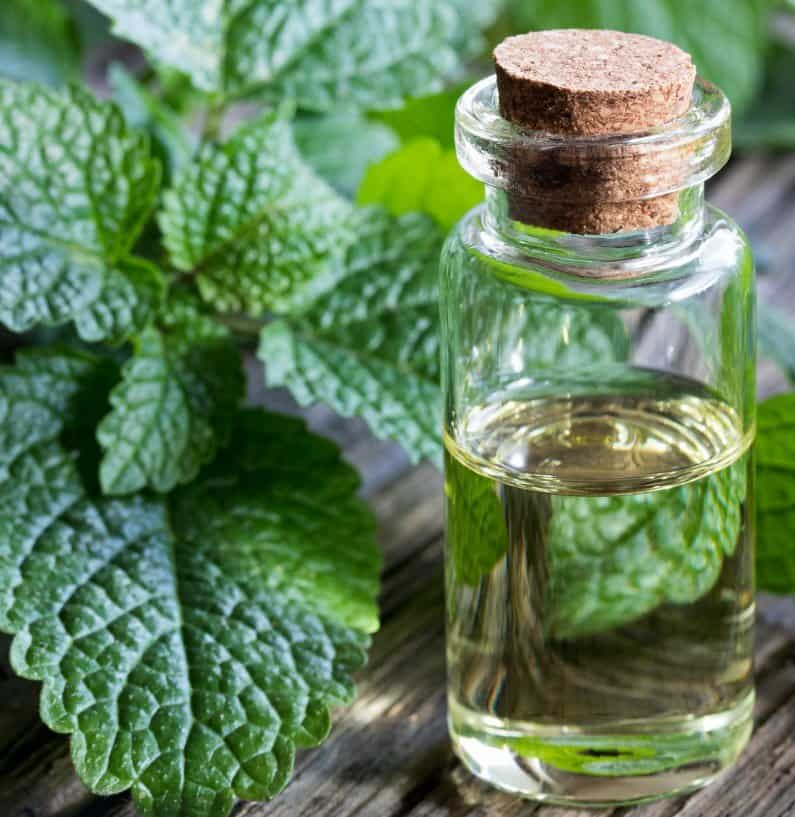
Peppermint Essential Oil
Peppermint essential oil, extracted from the leaves of the Mentha piperita plant, offers a myriad of benefits for the skin. Its potent antimicrobial properties make it an excellent choice for promoting a healthy and clear complexion by preventing the growth of bacteria on the skin's surface. The oil's cooling sensation is not only invigorating but also serves as a natural analgesic, helping to soothe and relieve irritated skin. This makes peppermint oil particularly valuable for addressing itching, redness, and inflammation. The astringent qualities of peppermint essential oil contribute to its ability to tone and tighten the skin. By constricting the skin's pores, it may help reduce the appearance of enlarged pores, providing a smoother and more refined complexion. Additionally, the oil's refreshing scent is known to have an uplifting effect on the mind, contributing to an overall sense of well-being. Peppermint oil is also recognized for its potential to alleviate discomfort associated with various skin conditions, such as sunburn or insect bites. The oil's menthol content produces a cooling effect, offering relief to irritated or inflamed skin.
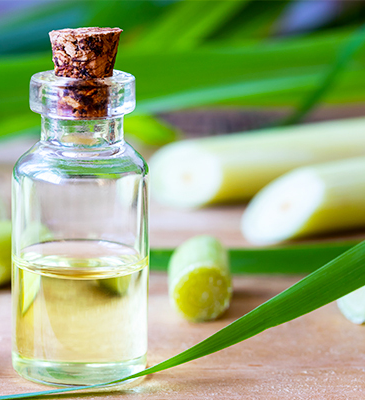
Lemongrass Essential Oil
Lemongrass essential oil, extracted from the leaves and stalks of the Cymbopogon citratus plant, boasts a range of benefits for the skin. Its potent antimicrobial properties make it effective in promoting skin health by inhibiting the growth of bacteria on the skin's surface. The oil's astringent nature contributes to its ability to tighten and tone the skin, making it a valuable addition to skincare routines, especially for those with oily or acne-prone skin. Lemongrass essential oil is also rich in antioxidants, including limonene and citral, which may help protect the skin from oxidative stress caused by free radicals. This antioxidant activity can contribute to a reduction in the appearance of fine lines and wrinkles, promoting a more youthful complexion. Beyond its physical benefits, the refreshing and citrusy aroma of lemongrass oil is widely appreciated for its mood-enhancing qualities. Inhaling the scent can provide an energizing and invigorating experience, making lemongrass oil a popular choice in aromatherapy.
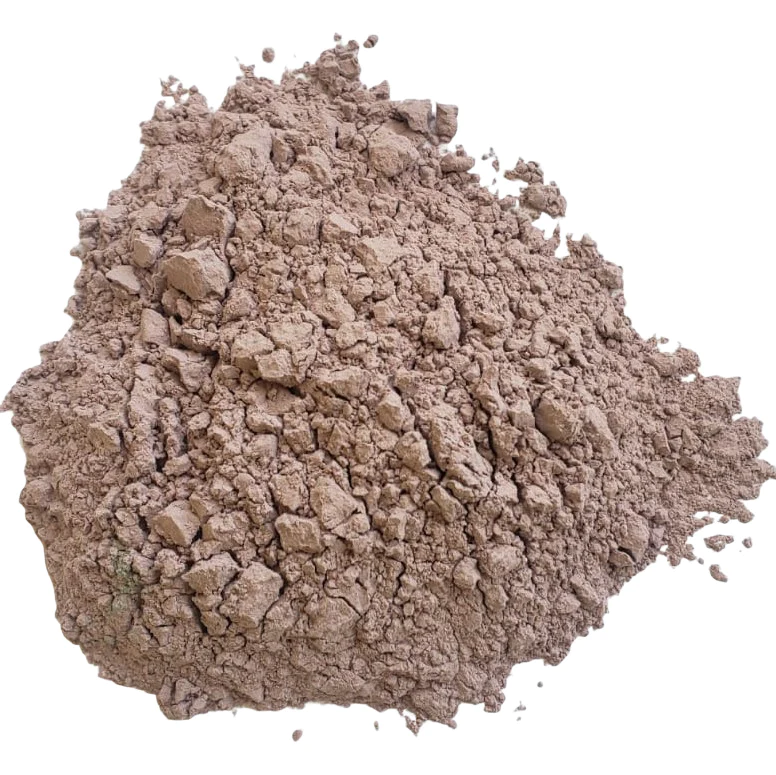
Brazilian Purple Clay
Brazilian Purple Clay is a unique skincare ingredient renowned for its numerous benefits for the skin. Sourced from the mineral-rich regions of Brazil, this clay is an excellent choice for skincare due to its detoxifying properties. Packed with essential minerals like magnesium, potassium, and copper, it not only helps draw out impurities and excess oil but also nourishes the skin with vital nutrients. Its gentle nature makes it suitable for various skin types, including sensitive skin, without causing excessive dryness or irritation. The vibrant purple color of the clay is indicative of its antioxidant content, which plays a crucial role in protecting the skin from free radicals. This antioxidant activity can contribute to reducing oxidative stress, preventing premature aging, and promoting a more resilient and youthful complexion. Brazilian Purple Clay is often used in skincare formulations, such as masks and cleansers, to unclog pores, refine skin texture, and enhance overall clarity. Beyond its cosmetic benefits, the clay's connection to the Brazilian rainforest adds a sustainable and eco-friendly aspect to its appeal.
